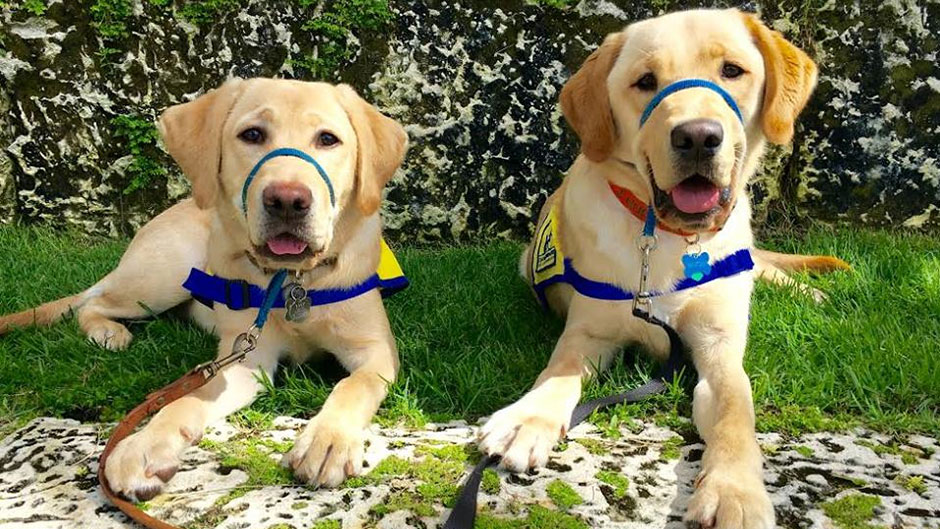When he arrived on campus last summer, Trenton was the smallest, youngest, and, arguably, cutest student at the University of Miami. After all, he was a tail-wagging 10-pound fur ball. Now, after gaining more than 60 pounds and a wealth of college experiences, he’s heading to graduate school in Orlando, breaking a few hearts on the way.
But the pain of his departure this week will be soothed in part by the legacy the yellow Labrador/golden retriever mix is leaving behind. Bred by Canine Companions for Independence (CCI) and placed with the family of Joy Beverly, senior residential faculty at Eaton Residential College, Trenton is the founding father of U PUP, one of the first University-based service clubs in the nation dedicated to raising CCI puppies that, one day, could become highly trained assistants for people with physical or developmental disabilities.
“It’s an awesome purpose and Trenton earns an A-plus for helping us get off the ground,” said senior Lindsey Slavin, U PUP’s co-president who jumped at the chance to start a puppy-raising service club when Beverly, a math instructor, mentioned it in her calculus class. “He’s so sweet. He genuinely wants to please you and learn something new.”
Trenton has yet to learn to open doors, pull wheelchairs, turn on lights, or perform innumerable other tasks most of us take for granted. He’ll spend the next six to eight months at CCI’s regional training center in Orlando for that and, if he proves his mettle, will be paired with a person who is eager to gain more independence. But over the past 18 months he has mastered the basic commands, social skills, and unflappable demeanor he came to college to learn.
“He doesn’t freak out at anything—skateboards, loud noises, elevators,” said Slavin, a psychology major who’s taken Trenton everywhere from Honor Council meetings to Publix to Black Friday shopping. “He’s completely calm. He walks around like he owns the place—with his head up high.’’
With a little help from Slavin and Beverly, whose family raised their first assistance dog-in-training off campus, Trenton also has helped U PUP’s membership and mission grow beyond expectations. Initially, Beverly and Slavin thought they’d be lucky to get 25 interested students. Today, the club, which had its first organizational meeting in September, boasts more than 125 members.
Some of them, like Slavin, and Beverly’s daughters, Samantha and Gabriela, are committed to U PUP’s primary goal of turning UM into a permanent training ground for CCI puppy-raisers who, year after year, will help the nonprofit meet the needs of physically or developmentally disabled people on its waiting list. Since its 1975 inception, CCI has placed 5,000 canine companions, including more than 140 with wounded military veterans. Hoping to expand its puppy-raising demographic and numbers, the organization just recently began recruiting at colleges.
“It is a new phenomenon for us,” said Martha Johnson, at CCI’s Orlando training center. “College students can expose our dogs to all kinds of socialization opportunities and they help us promote our mission. It’s also good for students. They’re learning communication skills, reporting skills, and responsibility. It is win-win for everyone.”
It’s also very serious business. U PUP tryouts for students who want to provide the structured environment, obedience training, and exposure to real-world situations that CCI requires of its puppy raisers will take place on Wednesday, November 2, and include a written test, and demonstration of their skills.
But, realizing that not everyone is able or willing to make that kind of commitment, Slavin came up with what Beverly called the “genius” idea of expanding U PUP’s mission. Today, U PUP members also volunteer at animal shelters, training and socializing dogs before they are adopted. And they take the Beverlys’ first CCI dog, Colin, to Best Buddy gatherings on campus, where he joins UM students in befriending people with intellectual and developmental disabilities and introducing them to new experiences.
Like most CCI puppies, Colin did not prove to be the gold-medal athlete that assistance dogs must be to make it through CCI’s advanced training. Only about 40 percent of them do. So there’s a chance that, like Colin, Trenton could be returned to one of his puppy raisers.
But as sad as it will be to leave Trenton at CCI’s training center on November 4, Slavin, the Beverlys, and everyone in the U PUP club are rooting for Trenton to make it through. They know that the sorrow of his parting will be tempered by the joy U PUP’s founding father would bring to a person who gains his loyal, loving, and highly skilled companionship.
“Look at this picture,” Beverly says, sharing a photo of a jubilant boy who was matched with his canine companion at a recent CCI graduation. “This shows you the full circle. This is why we do this. We also have to remember dogs are much better at moving on and reconnecting than we are, so it would be selfish for us to cry when we leave him in Orlando. We need to let him know we are happy for him.”
They also have Trenton’s CCI sister waiting in the wings. Her name is Dolce, and, at just 10 months old, she still has a lot more learning—and teaching—to do at college.
Faculty and staff who are interested in becoming CCI puppy raisers may contact Joy Beverly or Lindsey Slavin for more information. Students may learn more on OrgSync or on U PUP’s Facebook page.

